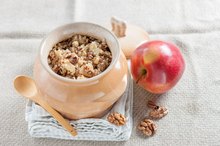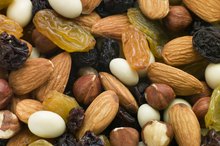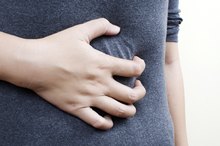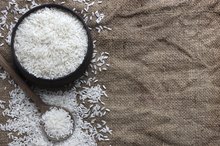Is Garlic Safe to Eat With Diverticulitis?
Diverticulitis is a condition of the lower intestine 2. It is characterized by inflammation of portions of the intestine in combination with the formation of small pouches within the intestinal wall. These pouches are what are of concern for those suffering from diverticulitis. The usual diet remedy omits foods that contain nuts, seeds or skins of any kind due to the risk of these substances becoming lodged in the pouches, thereby creating an infection. Garlic is one of those foods that fits easily into the diet of someone with diverticulitis.
If you are experiencing serious medical symptoms, seek emergency treatment immediately.
About Diverticulitis
Diverticulitis is caused by many bouts of constipation and associated high pressure in the intestinal area. A diet low or lacking in fiber may cause diverticulitis. One role that fiber plays in our bodies is that of a natural stool softener. If our stool is soft, it has a much easier journey through the lower intestine, and the intestine requires much less pressure to push it out during a bowel movement.
- Diverticulitis is caused by many bouts of constipation and associated high pressure in the intestinal area.
- If our stool is soft, it has a much easier journey through the lower intestine, and the intestine requires much less pressure to push it out during a bowel movement.
Garlic
Is It Okay to Eat Ground Flax Meal With Diverticulosis?
Learn More
Garlic is in the same family as leeks, shallots and onions. They are all botanicals, and garlic has also been used in herbal treatments of various diseases. Garlic is a natural blood thinner. Therefore, it may lower lipid levels in the blood and blood pressure.
- Garlic is in the same family as leeks, shallots and onions.
- They are all botanicals, and garlic has also been used in herbal treatments of various diseases.
Consumption of Garlic
According to Kathleen Mahan, M.S., R.D., and Sylvia Escott-Stump, M.A., R.D., the recommended dosage of garlic for someone without any health conditions is 4 g, or 1 clove per day. If you have diverticulitis, you can safely consume that same amount. Remove the skin of the clove and mince the garlic thoroughly before ingesting it. Finely chopping the garlic minimizes the risk of it becoming lodged in the disordered part of the intestine. Garlic in powder form is also fine for you if you have diverticulitis.
- According to Kathleen Mahan, M.S., R.D., and Sylvia Escott-Stump, M.A., R.D., the recommended dosage of garlic for someone without any health conditions is 4 g, or 1 clove per day.
- Finely chopping the garlic minimizes the risk of it becoming lodged in the disordered part of the intestine.
Consumption Warnings
Diverticulitis Diets for Diabetics
Learn More
Mahan and Escott-Stump define overconsumption of garlic as more than 5 raw cloves per day or more than 20 g per day 1. This may lead to mild allergic reactions, dermatitis, flatulence or heartburn. The authors also recommend avoiding garlic if you are pregnant. If you are taking blood thinners such as warfarin, please consult your doctor before adding any form of garlic to your diet.
- Mahan and Escott-Stump define overconsumption of garlic as more than 5 raw cloves per day or more than 20 g per day 1.
- The authors also recommend avoiding garlic if you are pregnant.
Related Articles
References
- "Krause's Food, Nutrition, & Diet Therapy, 11th edition"; L. Kathleen Mahan, et al.; 2004
- "Understanding Nutrition, 10th edition"; E. Whitney, et al.; 2005
- Garlic, raw. U.S. Department of Agriculture. Published April 1, 2019.
- Garlic. National Center for Complementary and Integrative Health. Updated September 2016.
- Bayan L, Koulivand PH, Gorji A. Garlic: a review of potential therapeutic effects. Avicenna J Phytomed. 2014;4(1):1–14.
- 7. Tsai C, Chen H, Sheen L, Lii C. Garlic: Health benefits and actions. Biomedicine (Taipei). 2012;2(1):17-29. doi:10.1016/j.biomed.2011.12.002
- 7. Zong J, Martirosyan D. Anticancer effects of garlic and garlic-derived bioactive compounds and its potential status as functional food. Bioactive Compounds in Health and Disease. 2018;1(2):16. doi:10.31989/bchd.v1i2.530
- Sugar and Spice and Everything Not So Nice. American College of Allergy, Asthma, and Immunology. Published November 8, 2012.
Writer Bio
Vanessa Carr has received a bachelor's degree in food and nutrition from Florida State University and went on to receive her master's degree in dietetics and nutrition from Florida International University. She has taught general nutrition sessions to Florida State University employees and has been certified as a personal trainer through the National Strength and Conditioning Association since 2008.









